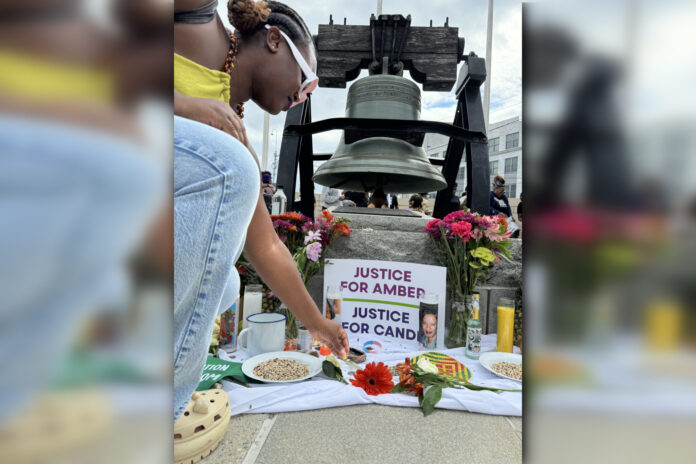
(Georgia Recorder) — Abortion rights advocates are cheering Monday’s court ruling that brought back expanded services in Georgia, even as they brace for the likelihood that further judicial action could make it short-lived.
And supporters of Georgia’s six-week abortion ban hope they are right.
Georgia Attorney General Chris Carr’s office is appealing a Fulton County judge’s ruling that the law conflicts with the Georgia Constitution, putting it back in the hands of the Georgia Supreme Court. Carr’s office has not said whether the state will ask the state’s highest court to allow the ban to be enforced while an appeal is pending.
That’s what happened in 2022, when the ban was back to being enforced within a week of a Fulton County ruling that the law was unconstitutional.
“Unfortunately, we have lived through this many times before. We know that our communities have unfortunately been jerked around by changes in the law that happened overnight,” said Kwajelyn Jackson, executive director of Feminist Women’s Health Center.

Georgia’s 2019 law bans most abortions once fetal cardiac activity is detected, which is about six weeks into a pregnancy and before most women know they are pregnant.
Fulton County Superior Court Judge Robert C. I. McBurney’s ruling that the law is unconstitutional comes just weeks before early voting starts in Georgia, including for state legislative races and the presidential election, where access to reproductive care has been a dominant issue.
And the decision was also issued two weeks after ProPublica published stories about two pregnant women, Amber Nicole Thurman and Candi Miller, who died after trying to have an abortion shortly after Georgia’s law took effect in 2022.
Both deaths were officially deemed preventable by the state’s Maternal Mortality Review Committee, according to ProPublica, which also reported that the committee that reviews maternal deaths has only examined deaths through the fall of 2022.
Their deaths have galvanized supporters of reproductive rights, who have long warned of dire outcomes. Advocates gathered outside the state Capitol Saturday to pay tribute to Thurman and Miller and to rally people to act, both during this election but also when lawmakers return to the Gold Dome in January when there will be a fresh push to repeal the law.
Vice President Kamala Harris visited the Atlanta suburbs just days after the stories were published to give a speech focused on reproductive rights, and Democratic vice presidential candidate and Minnesota Gov. Tim Walz cited Thurman’s death during Tuesday night’s debate when making the case that having state-by-state abortion laws is wrong.
“The fact of the matter is, how can we as a nation say that your life and your rights – as basic as the right to control your own life – is determined on geography? There’s a very real chance that if Amber Thurman lived in Minnesota, she would be alive today.”
Rep. Dar’shun Kendrick, a Lithonia Democrat, said she immediately thought of the two women when she heard about McBurney’s ruling.
“We won’t stop as your Georgia Democrats until abortion access is throughout the nation,” Kendrick said Tuesday at a press conference called by House Democrats to applaud the ruling. “We won’t go back, as Vice President Harris said.
“It might be too late for Amber and Candi, but their legacy and their story continue. Her and others give us the strength we need to carry on,” Kendrick said.
But anti-abortion advocates have blasted the attempts to tie the women’s deaths to the controversial 2019 law and accused Democrats of trying to capitalize on the tragedies. Women Speak Out PAC, a partner of Susan B. Anthony Pro-Life America, announced it would spend $500,000 on digital and TV ads in Georgia countering what it says is misinformation about the law.

“As policymakers, we should be presenting policy that improves outcomes rather than fear-mongering and lying to women about a law that does not prevent lifesaving care,” state Rep. Lauren Daniel, a Locust Grove Republican, said at a Tuesday press conference to defend the six-week ban that was already in the works before Monday’s ruling.
“It does not limit care for miscarriages, and it provides exceptions for medically futile babies and in cases of rape and incest,” said Daniel, who said she experienced a miscarriage last month and was presented three options, including a dilation and curettage, or D&C.
Backers of Georgia’s 2019 law argue the women’s deaths highlight the risks attached to abortion medication, and they say Thurman’s medical providers failed her when they waited 20 hours to perform a D&C since her twin fetuses did not have a heartbeat at that point.
Complications from medication abortion, which has been the most common way to terminate a pregnancy since 2020, are rare.
“Chemical abortion followed by malpractice from her health care providers is what killed Amber Nicole Thurman,” said state Sen. Ed Setzler, an Acworth Republican who sponsored the 2019 abortion measure.
Setzler said Thurman’s “health care providers had every mechanism they needed within our law to save her life.” And he called McBurney’s ruling “naked judicial activism.”
U.S. Congressman Rich McCormick, a Suwanee Republican and emergency room physician, argued Thurman’s death cannot be pinned on Georgia’s ban because her fetuses were already dead when she showed up at an Atlanta area hospital with sepsis that resulted from an incomplete abortion.
“There’s no application to this law to this case, unless you can tell me there was a heartbeat,” McCormick said. “It is a misused story to try to scare people to think that this law causes death, when in fact, it is the opposite.”
Kendrick, who is also an attorney, dismissed those objections. She said the law is ambiguous and forces doctors to wait until a patient’s life is clearly at risk before they intervene.
“They can claim all they want to, but the law is poorly, poorly written and never should have passed in the first place,” Kendrick said.






